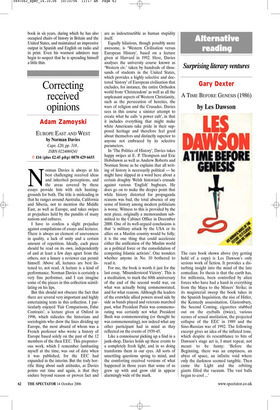Correcting received opinions
Adam Zamoyski
EUROPE EAST AND WEST by Norman Davies Cape, £20, pp. 318 , ISBN 0224069241 ✆ £16 (plus £2.45 p&p) 0870 429 6655 Norman Davies is always at his best challenging received ideas and inherited perceptions, and the areas covered by these essays provide him with rich huntinggrounds for both. The title is misleading in that he ranges around Australia, California and Siberia, not to mention the Middle East, as well as Europe, and takes swipes at prejudices held by the pundits of many nations and cultures.
I have to confess a slight prejudice against compilations of essays and lectures. There is always an element of unevenness in quality, a lack of unity and a certain amount of repetition. Ideally, each piece should be read on its own, independently of and at least a few days apart from the others, not a luxury a reviewer can permit himself. Above all, lectures are best listened to, not read. A lecture is a kind of performance. Norman Davies is certainly a very fine performer, and I can imagine some of the pieces in this collection scintillating on his lips.
But this should not obscure the fact that there are several very important and highly entertaining texts in this collection. I particularly enjoyed ‘Fair Comparisons, False Contrasts’, a lecture given at Oxford in 1996, which ridicules the historians and sociologists who drew the lines dividing up Europe, the most absurd of whom was a French professor who wrote a history of Europe based solely on the past of the 12 members of the then EEC. This preposterous work, which I remember lambasting myself at the time, was out of date when it was published, for the EEC had expanded in the interim. But the truly horrific thing about such attitudes, as Davies points out time and again, is that they endure beyond reason or proven fact and are as indesctructible as human stupidity itself.
Equally hilarious, though possibly more awesome, is ‘Western Civilisation versus European History’, based on a lecture given at Harvard in 1992. Here, Davies analyses the university course known as ‘Western civ.’ taken by hundreds of thousands of students in the United States, which provides a highly selective and doctored ‘history’ of European civilisation that excludes, for instance, the entire Orthodox world from ‘Christendom’ as well as all the unpleasant aspects of Western Christianity, such as the persecution of heretics, the wars of religion and the Crusades. Davies sees in this course a sinister attempt to create what he calls ‘a power cult’, in that it includes everything that might make white Americans take pride in their supposed heritage and therefore feel good about themselves and distinctly superior to anyone not embraced by its selective parameters.
In ‘The Politics of History’, Davies takes happy swipes at E. P. Thompson and Eric Hobsbawm as well as Andrew Roberts and Norman Stone as he explains that all writing of history is necessarily political — he might have slipped in a word here about a certain doughty Welsh historian’s crusade against various ‘English’ bugbears. He does go on to make the deeper point that while history distorted for propaganda reasons was bad, the total absence of any sense of history among modern politicians is worse. Witness to this is provided by the next piece, originally a memorandum submitted to the Cabinet Office in December 2000. One of its well-argued conclusions is that ‘a military attack by the USA or its allies on a Muslim country would be folly; it is the one thing that could accelerate either the unification of the Muslim world as a political force or the consolidation of competing Islamic activists’. One wonders whether anyone in No. 10 bothered to read it.
For me, the book is worth it just for the last essay, ‘Misunderstood Victory’. This is a meditation, to mark the 60th anniversary of the end of the second world war, on what was actually being commemorated, and for what reasons. Although the leaders of the erstwhile allied powers stood side by side as bands played and veterans marched past, what President Putin was commemorating was certainly not what President Bush was commemorating (or thought he was commemorating), nor indeed what any other participant had in mind as they reflected on the events of 1939-45.
Like a connoisseur picking up a find in a junk-shop, Davies holds up these events to a completely fresh light, and in so doing transforms them in our eyes. All sorts of unsettling questions spring to mind, and the comforting received versions of what happened in those years that some of us grew up with and grow old in appear alarmingly wide of the mark.


































































































 Previous page
Previous page